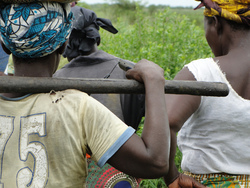By Sayaka Funada-Classen
Documento de Trabalho
Observador Rural
Numero 12 Dezembro 2013
This text is part of a debate about ProSAVANA and deals mainly with the article “The myths behind the ProSavana” (“Os mitos por trás do ProSavana”) written by Natalia Fingermann, published by the Instituto de Estudos Sociais e Económicos (IESE), series IDeIAS, Nº 49, on 29 May 2013. The reader can access this article from IESE's webpage.
The text we now publish in the Observador Nº 12 do OMR is more than just a debate between the two authors. Based on a detailed analysis of the ProSavana documents and on field research, Sayaka Funada-Classen deals with several areas, such as:
Sayaka Funada-Classen also analyses the possible relations of the ProSavana and other mega-projects being implemented in the area of the Nacala corridor.
Due to the importance of the theme, the OMR publishes this text as a contribution to the important debate about the ProSavana. Although the project is at the final stages of preparation, the author calls for the principle of "precaution approach" that enables to foresee future damages, considering also similar case-studies (comparative method).
Click here to download - Post-Fukushima Anatomy of Studies on ProSAVANA: Focusing on Natalia Fingermann’s "Myths behind ProSAVANA" (PDF)
(Em portugues)
Dr. Sayaka Funada-Classen is currently an Associate Professor at Tokyo University of Foreign Studies (TUFS) and has been working and doing research in Northern Mozambique since 1994. She has been chairperson of Needs Response Project for Fukushima’s Pregnant Women and Infant Children (FnnnP), since April 2011.
Her previous works on ProSAVANA: “Analysis of the discourse and background of the ProSAVANA programme in Mozambique – focusing on Japan’s role – and “Análise do Discurso e dos Antecedentes do Programa ProSAVANA em Moçambique – enfoque no papel do Japão – are available at http://farmlandgrab.org/post/view/21574 in English, and http://farmlandgrab.org/post/view/21802 in Portuguese.
Documento de Trabalho
Observador Rural
Numero 12 Dezembro 2013
This text is part of a debate about ProSAVANA and deals mainly with the article “The myths behind the ProSavana” (“Os mitos por trás do ProSavana”) written by Natalia Fingermann, published by the Instituto de Estudos Sociais e Económicos (IESE), series IDeIAS, Nº 49, on 29 May 2013. The reader can access this article from IESE's webpage.
The text we now publish in the Observador Nº 12 do OMR is more than just a debate between the two authors. Based on a detailed analysis of the ProSavana documents and on field research, Sayaka Funada-Classen deals with several areas, such as:
- The evolution of the philosophy and speeches about the ProSavana.
- The positions of the three involved parties (the governments of Mozambique, Brazil and Japan).
- The possible incoherence and incompatibilities for implementing fundamental aspects of underlying the ProSavana.
- The aspects to take care and alerts for precaution that should be considered when implementing the project.
Sayaka Funada-Classen also analyses the possible relations of the ProSavana and other mega-projects being implemented in the area of the Nacala corridor.
Due to the importance of the theme, the OMR publishes this text as a contribution to the important debate about the ProSavana. Although the project is at the final stages of preparation, the author calls for the principle of "precaution approach" that enables to foresee future damages, considering also similar case-studies (comparative method).
Click here to download - Post-Fukushima Anatomy of Studies on ProSAVANA: Focusing on Natalia Fingermann’s "Myths behind ProSAVANA" (PDF)
(Em portugues)
Dr. Sayaka Funada-Classen is currently an Associate Professor at Tokyo University of Foreign Studies (TUFS) and has been working and doing research in Northern Mozambique since 1994. She has been chairperson of Needs Response Project for Fukushima’s Pregnant Women and Infant Children (FnnnP), since April 2011.
Her previous works on ProSAVANA: “Analysis of the discourse and background of the ProSAVANA programme in Mozambique – focusing on Japan’s role – and “Análise do Discurso e dos Antecedentes do Programa ProSAVANA em Moçambique – enfoque no papel do Japão – are available at http://farmlandgrab.org/post/view/21574 in English, and http://farmlandgrab.org/post/view/21802 in Portuguese.













